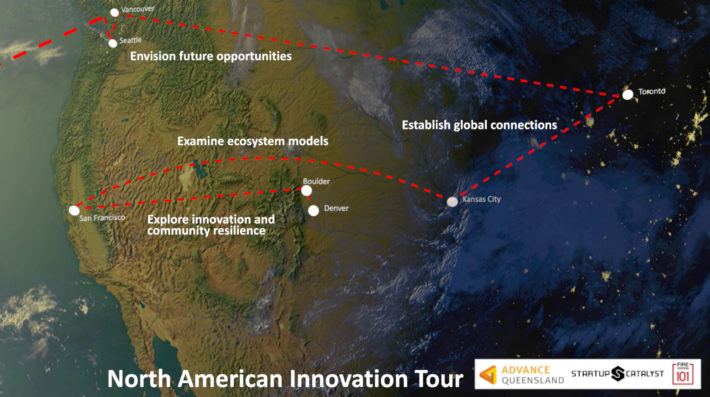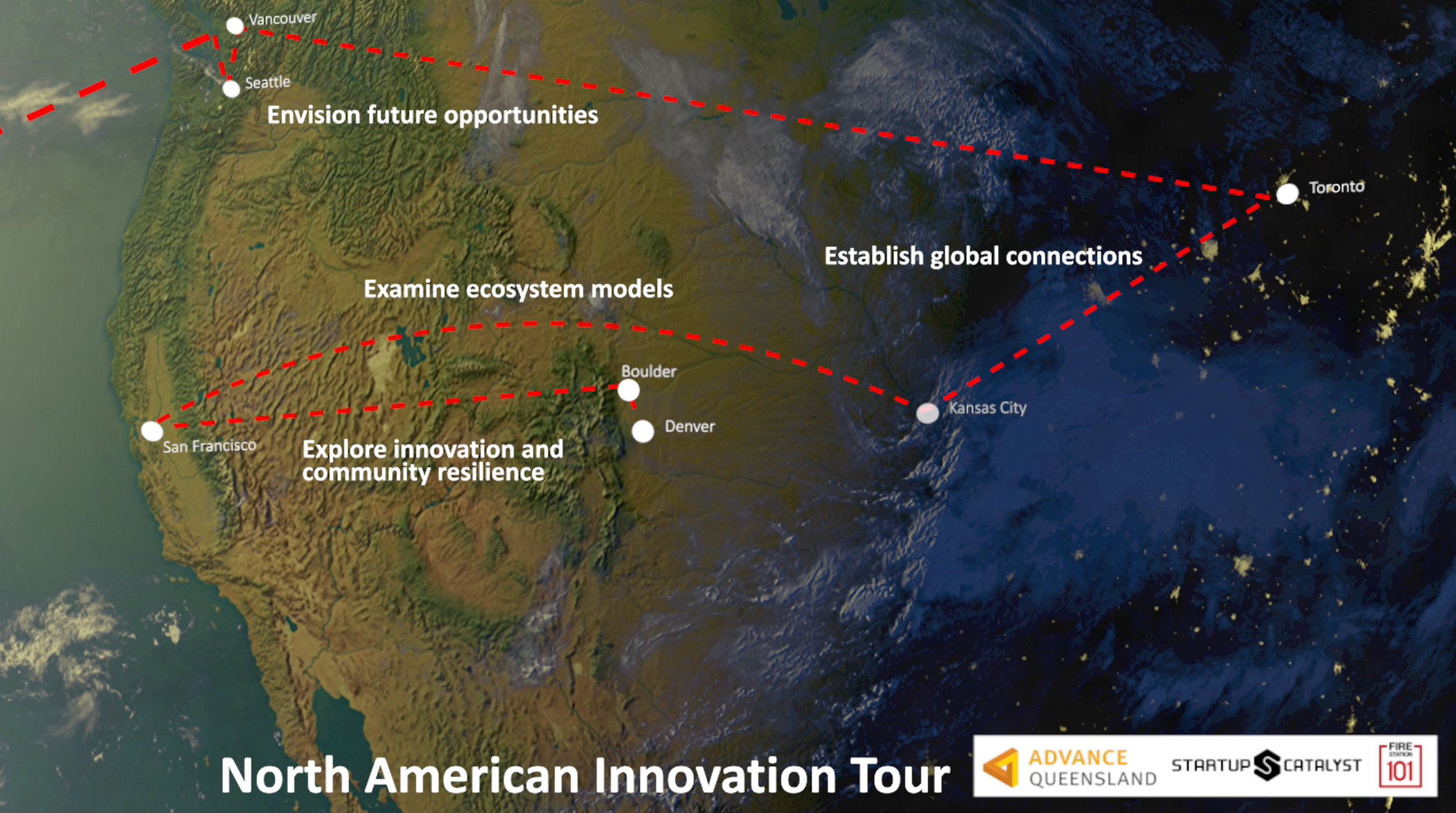A three-week, seven city North American innovation tour

How does an innovation hub build resilience in regional communities?
What makes an innovation hub or startup accelerator a success?
How can we fast-track global impact for local regional startups?
These are a few of the questions that are top of mind as I head out for a three-week tour of innovation hubs through seven North American cities.
Why am I going?
It has been almost 12 months since I stepped into the role of Community Manager for Fire Station 101, Ipswich City Council’s innovation hub. Launched in March, 2016, over 100 startups and entrepreneurs have joined and given it a go at building, growing, and scaling their business.
These bold entrepreneurs address challenges in sectors and technologies including automotive, virtual reality, accounting, legal, social enterprise, drones, education, agriculture, project management, recruitment, fitness, gaming, and more. We delivered over 100 events, including hackathons, meetups, executive strategy sessions, school programs, and hosted global dignitaries and other local councils. We facilitated the implementation of new companies, employment, investment, and built personal and community resilience.
Even with these outcomes and momentum, we know that we will not get to where we need to go with the same thinking that got us to where we are now. This applies as much to our strategy for year two as it did when the hub launched. So, I am investing in three weeks to experience other models first-hand. I aim to reset, refresh, and challenge my thinking as we prepare to deliver outcomes for our entrepreneur members and the broader community over the next twelve months.
My aims for the trip are to:
- Establish global connections for local startups,
- Bring back new ideas for regional hubs,
- Identify where I can personally have the most impact in the next two to three years, and
- Gain insights into my PhD research on the connection between regional hubs and community resilience.
Leg 1: Startup Catalyst
The first week of the trip is through a program called Startup Catalyst. Brainchild of investor, startup advocate, and Shark Tank mentor Steve Baxter and managed by CEO Aaron Birkby, the Startup Catalyst program takes entrepreneurs, leaders, and investors on tours of global innovation meccas to expand thinking, build capability, and facilitate connections.
The tour I am going on is focused on leaders within the Queensland startup ecosystem. Sharing the experience with other leaders from across Queensland will have a multiplier effect for the State as we create a shared vision and raise the overall standard of delivery for local entrepreneurs. I am very grateful for the sponsorship from the Advancing Regional Innovation Program Fund through the Advance Queensland program.
Colorado
The first stop will be in Denver and Boulder Colorado. With a population of only 100,000, Boulder is credited with a tech startup formation rate six times the US national average. Having read investor and entrepreneur Brad Feld’s description of the key attributes of success in his book Startup Communities, I am keen to see the words on paper in real life and understand how the lessons can be applied back in Australia.
Target sites on the Colorado list include: Boom Town Accelerator, Spark Boulder, Galvanise, Techstars, Shift Workspaces, SheEO, and Rockies Venture Club.
San Francisco
In the startup community, you often hear reference to places being the next Silicon Valley or the Silicon Valley of XX (Agriculture, hardware, etc.). I look forward to experiencing a region that reports an estimated 27,000 startups and 15,000 investors operating in an area roughly equivalent to the Brisbane-to-Gold Coast region, and with a population of roughly 7 million people.
Target sites on the San Francisco list include: Runway, Angel Labs, ReadWrite Labs, Impact Hub San Francisco, Startup House, 500 Startups, Hackers / Founders, Singularity University Labs, Workshop Café, Rocketspace, and WeWork.
Leg 2: Kansas City, Toronto, Seattle, Vancouver
I added two more weeks and a second leg of my trip to take advantage of being on the other side of the pond.
Kansas City
Kansas City was added for one visit: the Kauffman Foundation. I kept coming across the Kauffman Foundation in research on measuring ecosystems, and in particular the connection between innovation ecosystems and social impact. When a visiting entrepreneur from the States mentioned them again, I booked my ticket to Kansas City and then reached out to get a meeting.
I am also looking forward to connecting with the Kansas City Startup Village, seeing the 1 Million Cups presentation, and hope to connect with Plexpod and KC SourceLink.
Toronto
Toronto is another place where those in the know pointed me towards as a must-visit. My site visit list was referred to me by a contact at the Intelligent Community Forum: Communitech, Accelerator Centre, MaRS, and DMZ.
Seattle / Vancouver
Seattle and Vancouver are my home towns, having grown up near Seattle and finished high school near Vancouver. I am particularly keen to see where innovation sits in the development of Surrey and Abbottsford up north. I also expect to hit some Vancouver hubs like Hive and re-visit Impact Hub Seattle if I have time.
Come on the journey with me
So that’s the rough plan, which I expect will flex a bit as soon as I step off the plane. My intent is to blog, vlog, and otherwise be a social media pest through the journey. I invite you to follow, feedback, and guide me along my journey.
Please do drop me a line if you have any connections, people, or places you think would be important for me to see or if your goals and mine align around making a difference in the world.





Hi Chad,
Since you’re visiting several hubs in the US, you may find this Indian report useful: https://www.giz.de/en/downloads/giz2012-enablers-for-change-india-en.pdf
Good luck with your trip, work, and research.
Luc
Thanks Luc, great find!
Hello Brad – how exciting, first of all congratulations on your embarkment on the PhD journey, and secondly, on securing the funding for the first leg of your overseas innovation hub exploration! It so happens that I had a great discussion about the power of good innovation hubs with someone who has been having a ‘go’ at it in Silicon Valley for the last few years: It became clear that he envies our Government support that enables solid infrastructure (which in turn empowers F2F connection and learning); and our non-elitist attitude that does not limit start-up funding to those from elite universities such as Harvard, Yale or Stanford. Although he found that there are amazing opportunities there, there is no entrepreneurial skills development infrastructure either…So, some food for thought on where we have some real strengths! From my own experience with our innovation hub, an idea: Would it be possible for Firestation 101 to play an active role, in collaboration with Ipswich Council, to help the would-be entrepreneur to obtain personal income (which covers Firestation 101 membership fees and living costs) that would enable their continued development of entrepreneurial ideas and skills? Whether it be a part-time job with the Council or local community (in a position that would benefit both); or to be in the running for Government/Industry Entrepreneurial Skills Development Grants? This would be a more active role than what the hub currently offers, as it implies endorsement of the individual’s skills, expertise and potential as an entrepreneur; and a weight with this endorsement that is sufficient for Council to play an active role in supporting the individual to obtain the necessary income through a part-time job aligned with the individual’s skills, or through an innovation grant. I’m mentioning this idea as it has been my personal obstacle to becoming immersed in everything that Firestation 101 has to offer, to my detriment. I wonder how many more would-be entrepreneurs in our region experience the same obstacle? I believe that finding a mainstream job role at this point of personal development remains a difficult proposition for a number of reasons:
1. Age – the development of the necessary expertise and ideas has necessarily taken time, and the job market is geared towards younger people
2. Specialisation – us would-be entrepreneurs have necessarily honed our skills and expertise and thought processes with a single-minded focus to advance our ideas, thus making us a hard sell to a more generalised job market (and especially if we are left to explain ourselves!)
3. Fit – us would-be entrepreneurs have personality traits that need an understanding and welcoming work environment for out-of-the-box thinking and innovation on the fly, which unfortunately intimidates co-workers and bosses and isolates such individuals in the mainstream job market.
4. Time – we need time to work on our innovation project; the greater the alignment between a job and our ideas, the less time away we need – but at the crux of the matter we need to spend time on educating ourselves in a variety of ways, through traditional methods as well as through exchange of cutting-edge ideas and practicing of new skills. Thus, the idea that a job could at most be part-time, but has to pay well enough for subsistence and Firestation membership costs.
In regards to your PhD topic: I would be interested during your travels to hear how remote and regional communities become and stay ‘smart’, through collaborative communication technology use for evidence-based majority consensus decision-making: Dynamic policies; emergency and disaster management; etc.
Travel safely and enjoy!!
Kind regards,
Lisa
Good thoughts, Lisa. Thanks! I look forward to road testing them in my travels.
Did I really call you Brad instead of Chad?!!! Please forgive the 4am brain hiccup. Lisa